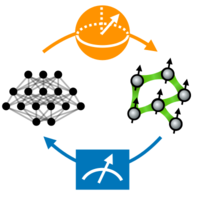Abstract
Machine learning with artificial neural networks is revolutionizing science. The most advanced challenges require discovering answers autonomously. In the domain of reinforcement learning, control strategies are improved according to a reward function. The power of neural-network-based reinforcement learning has been highlighted by spectacular recent successes such as playing Go, but its benefits for physics are yet to be demonstrated. Here, we show how a network-based “agent” can discover complete quantum-error-correction strategies, protecting a collection of qubits against noise. These strategies require feedback adapted to measurement outcomes. Finding them from scratch without human guidance and tailored to different hardware resources is a formidable challenge due to the combinatorially large search space. To solve this challenge, we develop two ideas: two-stage learning with teacher and student networks and a reward quantifying the capability to recover the quantum information stored in a multiqubit system. Beyond its immediate impact on quantum computation, our work more generally demonstrates the promise of neural-network-based reinforcement learning in physics.
- Received 23 April 2018
- Revised 12 June 2018
DOI:https://doi.org/10.1103/PhysRevX.8.031084
Published by the American Physical Society under the terms of the Creative Commons Attribution 4.0 International license. Further distribution of this work must maintain attribution to the author(s) and the published article’s title, journal citation, and DOI.
Published by the American Physical Society
Physics Subject Headings (PhySH)
Popular Summary
Artificial neural networks are revolutionizing science and technology, from image recognition and language processing to drug discovery and playing complex games. Here, we apply advanced techniques from the field of deep-reinforcement learning to solve formidable challenges in quantum physics. In particular, we demonstrate that artificial neural networks can discover novel strategies to improve the performance of quantum computing devices.
Building large-scale quantum computers is an outstanding challenge because of the fragility of qubits, the fundamental units of a quantum computer. While generic quantum error correction schemes have been invented, it is a critical open problem to find efficient strategies to protect qubits against noise in the specific hardware setting of an arbitrary real-world device. Discovering hardware-adapted strategies automatically using artificial neural networks may provide a solution to this problem, but it is a formidable task because of the huge search space of strategies.
Here, we employ reinforcement learning, a state-of-the-art approach widely seen as a promising building block for artificial intelligence, to make a neural network discover algorithms for quantum error correction for arbitrary hardware in a fully general way. Importantly, the neural network finds the strategies on its own, without human guidance. A key novelty of our work is the development of a measure that describes, at any time, how well the information stored in the quantum device is preserved, which elegantly helps to solve the large-search-space problem.
Given the flexibility of our approach in terms of hardware constraints, we expect our results to have an immediate impact across all fields that are striving to build quantum computers and simulators.



